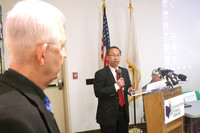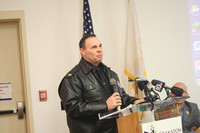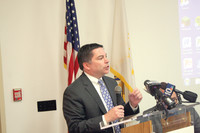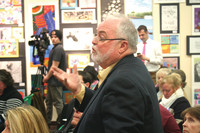By THOMAS GREENBERG Emergency medical personnel, local politicians, and the commissioner of the Federal Communications Commission all converged on Cranston Central Library Monday night for a summit on diversion of state funds from the 911 call center,
This item is available in full to subscribers.
We have recently launched a new and improved website. To continue reading, you will need to either log into your subscriber account, or purchase a new subscription.
If you are a current print subscriber, you can set up a free website account by clicking here.
Otherwise, click here to view your options for subscribing.
Please log in to continue |
|




Emergency medical personnel, local politicians, and the commissioner of the Federal Communications Commission all converged on Cranston Central Library Monday night for a summit on diversion of state funds from the 911 call center, organized by District 16’s Representative Robert Lancia.
The event focused on how to improve emergency response for people calling 911 who are in danger, especially in regards to long wait times, improving technology, and bettering the training of dispatchers.
The summit was spurred by a Lancia-led investigation into the state’s 911 call center, located at the State Police barracks in Scituate. According to Lancia, it is costing the state $5.4 million to run the center despite an operating budget of roughly $15 million. That money comes from a fee on every Rhode Islander’s phone bill that is allocated to 911. That fee is $1.00 per landline and $1.26 per cell phone line.
FCC Commissioner Michael O’Reilly confirmed Monday night that Rhode Island is “diverting” this money to its general fund, saying that Rhode Island is a “self-reporting diverting state.” He said that because of this, he argues that Rhode Island would not be eligible for federal 911 funding grants this year, since they “have diverted in the past and have made no changes to its practices.” He said $115 million in federal funding would be given out to 911 call centers this year.
O’Reilly said that this practice, which Lancia dubbed “scooping” money from one fund and putting it into another, is done in 20 other states. According to O’Reilly, Rhode Island is the second largest diverting state in that group in terms of overall amount diverted (in the 911 fund’s case nearly $10 million) and percentage diverted.
The lack of money allocated to the 911 call center, O’Reilly said, results in late emergency response times, worker fatigue for dispatchers, and an inability to invest in future technology to improve the call centers.
To talk about the lack of funding, emergency personnel were on hand at the library Monday as well, including Dr. Catherine Cummings, President of the Rhode Island Chapter of American College of Emergency Medicine and Dr. Joseph Lauro, a physician at Miriam Hospital and former paramedic who specializes in emergency medicine.
Dr. Cummings said that the entire 911 system can be improved, but one particular aspect that should be fixed right away is the training of dispatchers in CPR instructions.
“Dispatch-provided CPR instructions,” she said,” is one of the most proven aspects [of the chain of survival] that we can do better with.”
Dr. Lauro added that bystander CPR increases the survival rate in emergency cardiac situations by 200 percent, so a “fully staffed, fully equipped 911 call center could save the lives of many Rhode Islanders.”
Frank Palin, who is the chairman of the Coventry Fire District, voiced his opinion from the crowd, saying that technology is another aspect of the system that could be improved. He said that 70% of the calls that come into his 911 center are from mobile phones, which can’t be located through GPS.
“There’s a tremendous delay in a system that could be seamless,” he said.
Richard Susi, the Executive Director for the Rhode Island Association of Fire Chiefs, said that a texting system has yet to be put in as well, which could improve response time.
“This is a medical issue,” he said. “E-911 dispatch can save lives. We are determined to make ambulance and 911 system the best it can be. There’s no reason we can’t strive for improvements.”
Cranston’s Police Chief Michael Winquist also voiced concerns about the lack of technological improvements at the call center. He said that he has first-hand knowledge of the center, having worked as a Lieutenant Colonel for the state police before coming to Cranston, and he said that the technology they have there hasn’t changed at all from four years ago.
He didn’t blame the long wait times (which he said could be around two and half minutes) for those in emergency situations on the dispatchers, but rather on a lack of funding.
“I know first-hand how hard dispatchers work,” he said. “They’re simply understaffed and don’t have the tools or resources they deserve.”
Rep. Lancia said that despite the budget allotting for 47 employees at the call center, it currently employs 37.
Both Rep. Lancia and Mayor Allan Fung used this issue to speak politically, saying that the practice of “scooping” the funds from 911 center speaks to a larger issue.
“We have to let these individuals know what is going on and the impact it’s had on all of you, specifically the front-line workers,” Fung said. “These dollars could be used in so many critical and vital ways to help provide services to our residents.”
“This practice has got to stop,” Lancia said.
A statement from Governor Gina Raimondo’s office said that members of her department met with O’Reilly during his visit to tour the 911 center and that they had already begun making improvements to the center this year.
“Earlier this year, Governor Raimondo directed the Department of Public Safety to fill all remaining telecommunications vacancies at E911,” the statement read. “Since then the department has hired five new personnel. The department is currently recruiting and expects to hire additional telecommunications professionals this spring.”
Comments
No comments on this item Please log in to comment by clicking here